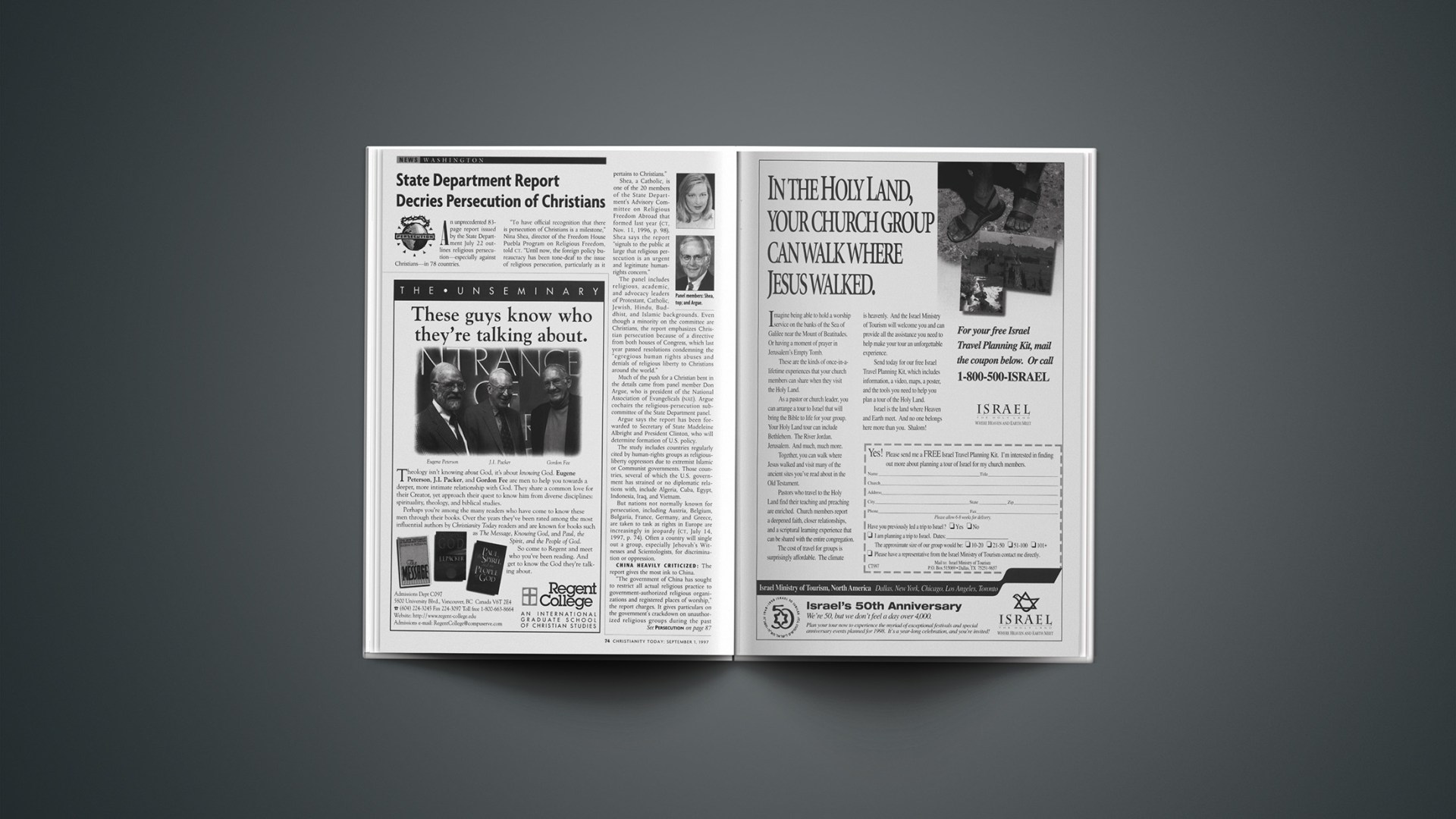An unprecedented 83-page report issued by the State Depart-ment July 22 outlines religious persecution—especially against Christians—in 78 countries.
“To have official recognition that there is persecution of Christians is a milestone,” Nina Shea, director of the Freedom House Puebla Program on Religious Freedom, told CT. “Until now, the foreign policy bureaucracy has been tone-deaf to the issue of religious persecution, particularly as it pertains to Christians.”
Shea, a Catholic, is one of the 20 members of the State Department’s Advisory Committee on Religious Freedom Abroad that formed last year (CT, Nov. 11, 1996, p. 98). Shea says the report “signals to the public at large that religious persecution is an urgent and legitimate human-rights concern.”
The panel includes religious, academic, and advocacy leaders of Protestant, Catholic, Jewish, Hindu, Buddhist, and Islamic backgrounds. Even though a minority on the committee are Christians, the report emphasizes Christian persecution because of a directive from both houses of Congress, which last year passed resolutions condemning the “egregious human rights abuses and denials of religious liberty to Christians around the world.”
Much of the push for a Christian bent in the details came from panel member Don Argue, who is president of the National Association of Evangelicals (NAE). Argue cochairs the religious-persecution subcommittee of the State Department panel.
Argue says the report has been forwarded to Secretary of State Madeleine Albright and President Clinton, who will determine formation of U.S. policy.
The study includes countries regularly cited by human-rights groups as religious-liberty oppressors due to extremist Islamic or Communist governments. Those countries, several of which the U.S. government has strained or no diplomatic relations with, include Algeria, Cuba, Egypt, Indonesia, Iraq, and Vietnam.
But nations not normally known for persecution, including Austria, Belgium, Bulgaria, France, Germany, and Greece, are taken to task as rights in Europe are increasingly in jeopardy (CT, July 14, 1997, p. 74). Often a country will single out a group, especially Jehovah’s Witnesses and Scientologists, for discrimination or oppression.
CHINA HEAVILY CRITICIZED: The report gives the most ink to China.
“The government of China has sought to restrict all actual religious practice to government-authorized religious organizations and registered places of worship,” the report charges. It gives particulars on the government’s crackdown on unauthorized religious groups during the past year, including raiding house churches and beating worshipers. “Local authorities used threats, demolition of property, extortion, fines, interrogation, detention, and reform-through-education sentences in carrying out this campaign.” The report says high-level U.S. officials have complained repeatedly of human-rights abuses in China.
In response to the report’s criticisms, Chinese Foreign Ministry spokesperson Tang Guoqiang said freedom of religion is constitutionally guaranteed and the United States “lacks the necessary understanding about China’s religious situation.”
POLITICAL CONNECTION: A bill that Congress is expected to debate in November, the Freedom from Religious Persecution Act (CT, Aug. 11, 1997, p. 61), would ban all exports and halt economic aid to foreign nations that sponsor persecution.
Argue says the bill reflects the initiatives outlined in the NAE’s Statement of Conscience issued in January 1996, which called on the U.S. government to “adopt policies that would limit religious persecution” worldwide.
The Clinton administration insists that religious persecution does have an impact on U.S. foreign policy. For instance, the “dismal human rights record and a continuing pattern of severe repression” in Myanmar (formerly Burma) prompted Clinton to ban new investment in the country in April, the report indicates. The study details problems in Buddhist-dominated Myanmar, including rapes of Christian women of the Karen tribe and abductions and murders of refugees.
The U.S. government has repeatedly urged Pakistan to repeal a discriminatory blasphemy law that has led to the destruction of homes and churches belonging to Christians.
And last year the United States suspended diplomatic ties with Sudan. “There are reports that many Christians are victims of slave raids and forced conversion,” the document states.
Steve Haas, U.S. coordinator for the International Day of Prayer for the Persecuted Church, is impressed that the report is so current and specific. For instance, it mentions the restrictive law passed by the Russian Duma and vetoed by President Boris Yeltsin that would have restricted religious freedoms (CT, Aug. 11, 1997, p. 61) and an antimissionary bill pending before the Israeli Knesset that would prohibit distribution of religious evangelistic materials (CT, May 19, 1997, p. 55).
Copyright © 1997 Christianity Today. Click for reprint information.










